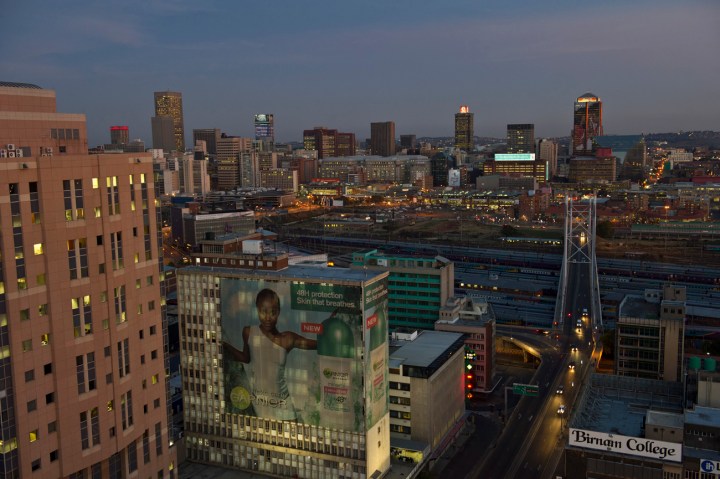Business Maverick, Maverick Life, South Africa
Joburg city’s mean parking streets

Johannesburg road users are up in arms again. As the next phase of the city’s roadside parking system is rolled out, the cost of parking on the city’s streets is about to cost more than crossing a car guard’s palm with silver, but it’s certainly not the city of Joburg that’s enjoying the added income. By KHADIJA PATEL.
In the din of the late-afternoon traffic in Braamfontein, a woman double-parked on Jorrissen Street shouts to her friend to hurry up. Her friend rushes to the car, watched by the beady-eyed Metro police officer and an Ace Parking attendant. “Now I have a fucking fine!” she shouts angrily. The friend gets into the car gingerly, cautious not to cause further upset, but the Metro police officer is unfazed.
The parking attendant turns to me meaningfully.
“You see, this is what we face every day.”
The roadside parking system in place in the Johannesburg central business district and Braamfontein since December 2010 is soon to be extended to the suburbs of Norwood, Melville, Brixton, Emmarentia, Rosebank, Roodepoort, Birnam, Parkview, Sandton, Florida, Fordsburg, Greenside, Linden, Rivonia, Craighall Park and Northcliff.
The system requires road users to fork out R4 for 30 minutes and R8 for an hour and is set to rise to R8,50 in July. In Parkhurst, where the system was implemented in March this year, residents and business owners have been particularly vociferous of their dissatisfaction with the system, signalling as well their intent to pursue legal action against the city for the lack of public participation in the process.
The Parkhurst community blames the high parking tariffs on a sharp fall in business in the last month, but the money is certainly not making its way into the city’s coffers. On Tuesday, Business Day reported the city of Johannesburg will receive just 20%-40% of the total income generated from kerbside parking payments, depending on whether the suburb has the potential for higher or lower income.
The balance of the generated income is retained by Ace Parking, the company with the good fortune of managing the system. And the city of Joburg, world-class as it so tautly touts itself to be, has been content to waive the responsibility of the job creation component of the scheme to Ace Parking.
Employees of the company, however, complain they toil away in the streets of Joburg, braving the elements and road hazards only to receive a measly 15% commission of the parking fees they collect. They are not paid a basic salary. On an average day in one area of the CBD, Ace employees claim to collect a healthy R11,000 in sum but each attendant collects an average of R200 a day.
“At the end of the month we are left sometimes with just R300.”
*Zanele, a 24-year old Ace attendant from Soweto is particularly scathing of her employers’ failure to offer her a basic salary.
“The people who park, they complain but most of them are getting used to it, but these people, Ace, they don’t give us a basic salary, they don’t give us days off when we are sick. Even when I was hit by a car here, in my job, they did not pay even one cent.”
“Look,” she says, pointing to her attire, a snug black jack worn over black pants, her Ace badge dangling from its perch on her hip. “They did not even give me a uniform. Today, this morning, one man asked me how he can give me money if I am not wearing a uniform.”
On its website, Ace Parking indicates its attendants will be “professionally uniformed”. Zanele, holding the Pay & Display Terminal and Printer looks like an aggrandised car guard.
Beside her, her colleague *Robert, a 34-year old father of two is decked out in a branded Ace jacket. He’s been working for Ace Parking for the past 8 months and, unlike Zanele, has been outfitted in the Ace uniform.
Zanele says she’s told by her superiors that there is not sufficient funds to furnish her with a full uniform.
“All our requests are ignored,” she says.
“It’s not easy to work on the streets,” Robert says.
“Most people don’t want to pay for parking.
Every day people are telling us they’ll give us the money for ourselves, we should just print the receipt but we can’t go on like that forever.
We also need to earn money.
“Last week we were told there is no chance for us to get a basic salary.
Some of us, we were talking about a strike but they told us, if you go on strike, then we’ll lose the contract and you’ll be out of jobs.
Just to spite Ace, I’ll be happy if they lose their contract here but then I’ll be without a job.”
I interrupt their diatribe against their employers to ask why they continue to work for Ace if indeed they are that bad.
“I can’t sit around the whole day in the township and beg,” Robert says.
“At least I’m working.”
In the stores that line the street Zanele and Robert are working on, businesses offer a mixed account of the effects the parking system has had on their bottom line. Jeeteen Narotam, who runs a men’s outfitters store, says his customers have grown used to the parking system, but every now and then he’s forced to pay the parking fee on behalf of stubborn customers and suppliers.
Asked if he would support the Parkhurst community in their legal action against the city, he replies immediately.
“Definitely.”
Ntsieni Mudau runs a music store nearby. He believes opposition to the parking system – and the e-tolls – stems from a virulently anti-ANC stance among the more privileged members of Johannesburg society.
“In the beginning when the system was introduced, suddenly the road was deserted. Before you couldn’t find a parking here outside,” he gestures. “But now, slowly, the street is filling up again. People have gotten used to it,” he says.
“The council has to take over from Ace,” Robert concludes emphatically. He takes strength from the hullabaloo over the system in Parkhurst, confident that the city of Joburg will be forced to do something to intervene, for the better of disgruntled residents, business people and parking attendants alike.
In sum, we have only recently witnessed attempts to effectively regulate parking for the betterment of urban transport in South Africa. The local government of Cape Town introduced a similar system to their streets, but Cape authorities have prided themselves on the extent of the public participation process before the system was introduced.
Urban planners caution there is a lot more to a city’s parking facilities than we perceive, speaking even of the art and science behind metered parking. Rolling out a parking system as Joburg is currently doing, is one measure in a broader campaign to influence private transport users to move to public transport, combat urban sprawl and congested roads. The implementation of the parking system will not be popular, but with adequate information Joburgers may grudgingly concede that it is a necessary step towards rendering the city world class.
The devil, however, lurks smugly in the details. If indeed the city of Joburg is to persist in outsourcing services, then surely they need also to protect both communities and employees from the companies these services enrich. Ace Parking walks off with the lion’s share of the earnings, but what remains for Joburgers, the people forking out a little bit extra for their Saturday brunch in Parkhurst?
It’s the revenue return that is the most important part of the parking policy. It’s all good and well that this programme may eventually ease congestion, cut greenhouse emissions and save residents from their freeloading selves, but in order for this programme to be sustainable, it’s crucial that the affected communities are able to see the fruits of this income.
Without physical proof of the benefits to the community it is hard to support the idea. If Ace is not able to win the trust of its own employees, how then are Joburgers expected to trust them to manage the city’s parking programme with integrity and efficiency?
And when their entire contribution to the process seems to be the collection of fees from the attendants, remind us why Johannesburg actually needs companies like Ace Parking?
*Caveat lector: Zanele and Robert are not the real names of the parking attendants. Fearing for their jobs, they requested anonymity. DM
Read more:
- City of Johannesburg to get fraction of parking bay money in Business Day.
- Fury over R8-an-hour Gauteng parking on IOL.


















 Become an Insider
Become an Insider